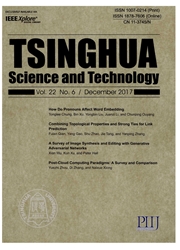

 中文摘要:
中文摘要:
Virtual Machine(VM) allocation for multiple tenants is an important and challenging problem to provide efficient infrastructure services in cloud data centers. Tenants run applications on their allocated VMs, and the network distance between a tenant’s VMs may considerably impact the tenant’s Quality of Service(Qo S). In this study, we define and formulate the multi-tenant VM allocation problem in cloud data centers, considering the VM requirements of different tenants, and introducing the allocation goal of minimizing the sum of the VMs’ network diameters of all tenants. Then, we propose a Layered Progressive resource allocation algorithm for multi-tenant cloud data centers based on the Multiple Knapsack Problem(LP-MKP). The LP-MKP algorithm uses a multi-stage layered progressive method for multi-tenant VM allocation and efficiently handles unprocessed tenants at each stage. This reduces resource fragmentation in cloud data centers, decreases the differences in the Qo S among tenants, and improves tenants’ overall Qo S in cloud data centers. We perform experiments to evaluate the LP-MKP algorithm and demonstrate that it can provide significant gains over other allocation algorithms.
 英文摘要:
英文摘要:
Virtual Machine(VM) allocation for multiple tenants is an important and challenging problem to provide efficient infrastructure services in cloud data centers. Tenants run applications on their allocated VMs, and the network distance between a tenant's VMs may considerably impact the tenant's Quality of Service(Qo S). In this study, we define and formulate the multi-tenant VM allocation problem in cloud data centers, considering the VM requirements of different tenants, and introducing the allocation goal of minimizing the sum of the VMs' network diameters of all tenants. Then, we propose a Layered Progressive resource allocation algorithm for multi-tenant cloud data centers based on the Multiple Knapsack Problem(LP-MKP). The LP-MKP algorithm uses a multi-stage layered progressive method for multi-tenant VM allocation and efficiently handles unprocessed tenants at each stage. This reduces resource fragmentation in cloud data centers, decreases the differences in the Qo S among tenants, and improves tenants' overall Qo S in cloud data centers. We perform experiments to evaluate the LP-MKP algorithm and demonstrate that it can provide significant gains over other allocation algorithms.
 同期刊论文项目
同期刊论文项目
 同项目期刊论文
同项目期刊论文
 期刊信息
期刊信息
